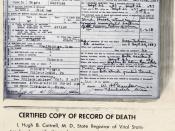Edward Albee believed in the unity of family, as he chose to focus on family relationships in many of his plays. Born in our nation's capitol (Washington, D.C.) in 1928, he was adopted by a theater executive named Reed A. Albee of the Keith-Albee chain of vaudeville and motion picture theaters. Edward is known for the symbolic dialogue and realism of his plays, and praised for resembling theater of the absurd characters (people who are unwilling to communicate or sympathize or empathize with each other) as well as criticizing long accepted but immoral ideas and values. He is called the most recent Eugene O' Neill.
He attended many prep schools as a youth, and stayed at the Trinity College in Hartford, Connecticut for a short while. He juggled through many odd jobs, before he decided to be a playwright. His first play was written in just three weeks in 1959 at the tender age of 31 called The Zoo Story.
His first play focused on how when there is a failure to communicate, problems can arise, in this case death. Though it was a short one-act, it was quick, witty, concise, to the point, and catchy because it drew the reader's attention. He next received his inspiration from a recent death of the famous jazz singer, Bessie Smith, in a car accident and put it into words in 1960; it was entitled Bessie Smith. In the next year, he wrote The American Dream criticizing our values in just one act.
In 1962, he increased the length of his plays with his most famous Who's Afraid of Virginia Woolf?, written in three acts, and telling the story of marriage through reality and illusions. In fact, it was so popular, that performances are made all the time and a film was made. He was denied a Pulitzer due to sexual situations, but won many drama awards. In 1963, Albee wrote his own adaptation of a story by Carson McCrullers called The Ballad of the Sad Café, a modern Gothic story of a café owner who falls in love with her dwarf cousin who falls in love with her husband! Tiny Alice of 1964 came next, questioning religions, and finally in 1966 he won a Pulitzer for A Delicate Balance in the following year, 1967. He then wrote All Over of 1971, focusing on the impact a famous man's countdown to death made on his own family and friends, staying on a personal level.
In 1975, Seascape, which held a short run on Broadway, won him another Pulitzer. Then came The Lady From Dubuque of 1977, an adaptation of Vladimir Nabokov's Lolita, and Man With Three Arms of 1983. 1994 was another good year for Albee as he then went on to win his third Pulitzer for a play he had written just four years earlier, Three Tall Women. As far as I know and as my references tell me, he is still living.





